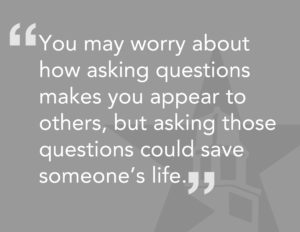In the 21st century, people enjoy things that are tragically beautiful. People take to the idea of “ending the stigma” around mental illness like a dog to water, but not always in a healthy way. I’m here to talk about those times when people take “erasing the stigma” too far. Using language about mental illness in a casual way can undermine the experience of those with mental illness and create unhealthy cultural norms.
I often hear people casually throw these sentences around: “Wow, I had water for lunch today. I’m literally so anorexic.” or, “Pretty sure I just bombed that chemistry lab, I’m so depressed.” Or even better, “I cleaned my room for two hours today! My OCD gets the best of me all the time!”

Society has turned mental illness into something that’s creative, sometimes even edgy. Suddenly, everyone and their mother has anxiety, depression, anorexia, or OCD. They’re convinced that having some sort of mental illness will aid them in making friends or help them fit in. I recently stumbled across something called “The Hunger Blogs” and soon was sucked deep into hours’ worth of high contrast, black-and-white photos of collarbones, hipbones, and exposed ribs. For those who are unfamiliar, “pro-ana” sites are websites that advocate anorexia. Pro-mia sites are sites that advocate bulimia. These sites consist of groups of people that are brought together because of the one thing they have in common—eating disorders. People post tips on how to keep their illness hidden. How to lose weight fast. This is what they call “thinspiration,” and it made me sick to my stomach. These sites intentionally encourage mental illness, but cultural ignorance can have a similar effect. As somebody who was born and raised in Asia, I have seen some crazy beauty standards that do nothing more than promote eating disorders. I really don’t think that a healthy person’s waist should disappear behind a sheet of A4 paper.
Since when did associating ourselves and others with something that is so painful become a normal thing to do? Having a mental disorder is not beautiful, it’s real. It’s all consuming, it’s draining, it hurts. Some people who genuinely suffer from these illnesses find it nearly impossible to talk about them.
Let me break it down for you. Just because you cried when Marley died in Marley and Me does not mean you have depression. You do not have anxiety because you get nervous 30 minutes before your Western Civ exam. You do not have PTSD just because you were elbowed by a boy one time in seventh grade. Just because you didn’t sleep well one night does not mean that you’re an insomniac. You do not have OCD because you are slightly more organized than most people, you do not have anorexia because you skipped a meal, and you do not have bipolar disorder because you’re PMS-ing.
Depression is not beautiful. Having your hair fall out because you aren’t eating anything is not classy. Panic attacks are not fun. Constantly falling asleep in class and having permanent dark eye circles because you haven’t slept in days is not adorable. You don’t have to be a rocket scientist to know that depression looks nothing like how Hannah Baker made it look. It’s feeling yourself slowly spiraling out of control, with no clue how to fix it, and living every day in a war zone. It’s sleepless nights, medication that makes you feel like a zombie, under-eating, overeating, and that intense feeling of dread whenever you even think about stepping on a scale. It’s making plans, cancelling them last minute and losing friends. It’s the crappy feeling of being too much, yet not enough.
I don’t know about you, but I don’t think walking around every single day feeling like there’s a fifty pound weight on my shoulders is enjoyable. I don’t think being ready to give up before the clock even hits 8 a.m. is beautiful. Pain equals pain, and pain isn’t pretty. So please, stop romanticizing mental illness before it becomes an even bigger problem in society than it is now. Our words and our actions have more of an impact on others and on ourselves than we know.
Celine is a sophomore majoring in psychology and political science.

 As we grow older, I feel like our curiosity dims. We let other stressors in our mind. Responsibilities take over. We’re at that age where everything kind of makes sense, but kind of doesn’t. We’re old enough to have an idea of what the real world is like, yet we’re too young to truly understand. We say we know how to adult–but do we actually? Things that used to be the center of our attention are now pushed to the archives of our mind. We all act like we have everything together because in the outside world it’s a common belief that in order to be viewed and respected as a high-functioning adult, we have to be organized all the time. But we don’t. Sharing our questions with others is a healthy process that shapes our growth and strengthens our relationships with those around us.
As we grow older, I feel like our curiosity dims. We let other stressors in our mind. Responsibilities take over. We’re at that age where everything kind of makes sense, but kind of doesn’t. We’re old enough to have an idea of what the real world is like, yet we’re too young to truly understand. We say we know how to adult–but do we actually? Things that used to be the center of our attention are now pushed to the archives of our mind. We all act like we have everything together because in the outside world it’s a common belief that in order to be viewed and respected as a high-functioning adult, we have to be organized all the time. But we don’t. Sharing our questions with others is a healthy process that shapes our growth and strengthens our relationships with those around us.  Most people aren’t just going to walk up to you and ask you for help. Sometimes, you have to offer it to them. Sometimes, you’re going to be on the other end, asking for help. Asking for help isn’t easy, nor is offering. You may worry about how asking questions makes you appear to others, but asking those questions could save someone’s life. It doesn’t take much at all–offering a kind smile, a simple hello, or a listening ear is a start. Once a relationship has been established, you may be able to offer honest words of encouragement. Too often we underestimate the power of even the littlest gesture of kindness–but each of these has so much potential to turn a life around.
Most people aren’t just going to walk up to you and ask you for help. Sometimes, you have to offer it to them. Sometimes, you’re going to be on the other end, asking for help. Asking for help isn’t easy, nor is offering. You may worry about how asking questions makes you appear to others, but asking those questions could save someone’s life. It doesn’t take much at all–offering a kind smile, a simple hello, or a listening ear is a start. Once a relationship has been established, you may be able to offer honest words of encouragement. Too often we underestimate the power of even the littlest gesture of kindness–but each of these has so much potential to turn a life around.